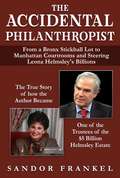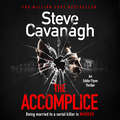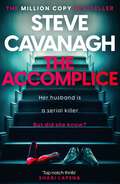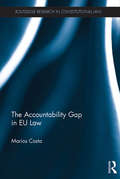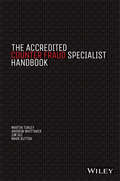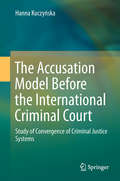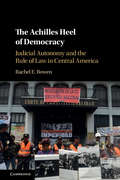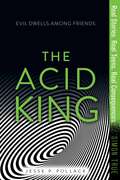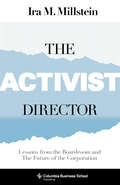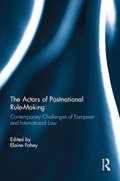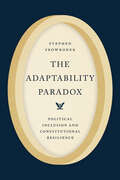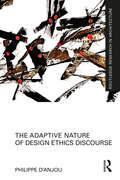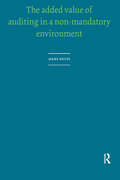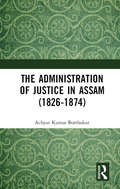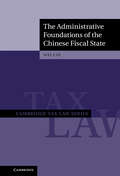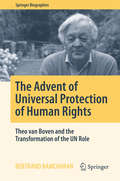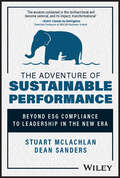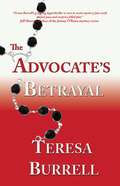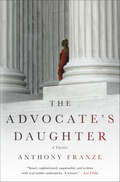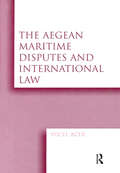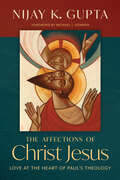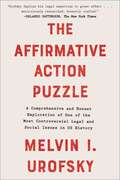- Table View
- List View
The Accidental Philanthropist: From A Bronx Stickball Lot to Manhattan Courtrooms and Steering Leona Helmsley's Billions
by Sandor FrankelThe True Story of an Extraordinary Journey from the Bronx to the Helm of the $5 Billion Helmsley Charitable Trust, Doling Out Unimaginable Amounts of Money for the Good of the World. The Author met his client in the prison&’s visitors&’ room: he, the lawyer, and she, his client, now being patted down by a guard following the first night of a four-year sentence. Identified here by an inmate number, she was known worldwide: the notorious Leona Helmsley, owner of a gargantuan real estate portfolio; the woman who had reputedly scoffed &“Only the little people pay taxes"; the &“queen of mean&” whom Newsweek described as &“rhymes with rich.&” Wolfing down popcorn the author bought her from the prison vending machine, she was one of the most maligned people on the planet. What he saw, though, was a frightened 71-year-old inmate, alone and in need of something altogether absent from her life: someone she could trust. In her eyes, he was perhaps the closest thing. Two years earlier, he had joined her legal team following her conviction for tax crimes. Just two days before, in her sumptuous Manhattan penthouse, she ferociously fired one lawyer while the others quit. He was the last man standing. In time, he became not just her go-to lawyer but her consigliere. He now had to deal with the countless people trying to dip a pinky or a shovel into her fortune. She also presented him with a host of personal issues. Ultimately, she named him as one of her executors, charged with overseeing and liquidating her multi-billion dollar estate, and also one of the trustees of a charitable trust she would fund &“to improve lives…around the world.&” That is how, on Leona Helmsley&’s death in 2007, the author became a steward of her $5 billion fortune, which he and his co-trustees were duty-bound to give away to causes and recipients they alone would determine. Little in his life had prepared him for such a role. He grew up in a lower middle-class section of the Bronx, wound up at Harvard Law School, and built a successful career as a trial lawyer, representing some of the rich and famous and some ordinary folks. But overseeing perhaps the largest private real estate empire in the country, selling all those properties and the assorted bonds, diamonds, and other playthings of the rich, and choosing the goals of a vast charitable trust funded with those sales&’ proceeds, was something else altogether. He tasted the nectar of instant popularity, and became incontrovertible proof that when you control billions of dollars, you become wittier, funnier, far more profound than you&’ve ever been, and always worth listening to. Friends, pseudo-friends, former friends, would-be friends, quasi friends, friends of friends—everyone comes knocking. The Accidental Philanthropist tells how all this happened.
The Accomplice: THE INSTANT SUNDAY TIMES TOP TEN BESTSELLER (Eddie Flynn Series)
by Steve CavanaghThe new Eddie Flynn novel from the Sunday Times and million copy bestselling author of THIRTEEN, FIFTY FIFTY and THE DEVIL'S ADVOCATE.'This guy is the real deal. Trust me.' LEE CHILD 'Top notch thrills and courtroom drama' SHARI LAPENA 'A terrific writer. He has talent to burn.' DON WINSLOW'Just when you thought there were no new twists to bring to the legal thriller, Cavanagh comes along and knocks your socks off. The high courts meet high concepts.' LINWOOD BARCLAY THE MOST HATED WOMAN IN AMERICAThe Sandman killings have been solved. Daniel Miller murdered fourteen people before he vanished. His wife, Carrie, now faces trial as his accomplice. The FBI, the District Attorney, the media and everyone in America believe she knew and helped cover up her husband's crimes.THE LAWYEREddie Flynn won't take a case unless his client is innocent. Now, he has to prove to a jury, and the entire world, that Carrie Miller was just another victim of the Sandman. She didn't know her husband's dark side and she had no part in the murders. But so far, Eddie and his team are the only ones who believe her.THE FORMER FBI AGENTGabriel Lake used to be a federal agent, before someone tried to kill him. Now, he's an investigator with a vendetta against the Sandman. He's the only one who can catch him, because he believes that everything the FBI knows about serial killers is wrong.THE KILLERWith his wife on trial, the Sandman is forced to come out of hiding to save her from a life sentence. He will kill to protect her and everyone involved in the case is a target.Even Eddie Flynn...
The Accomplice: The gripping, must-read thriller (Eddie Flynn Series)
by Steve CavanaghHER HUSBAND IS A SERIAL KILLER. BUT DID SHE KNOW?'This guy is the real deal. Trust me.' LEE CHILD'Top notch thrills and courtroom drama' SHARI LAPENA'Steve Cavanagh's twists hit you between the eyes. You never see them coming' ANTHONY HOROWITZDaniel Miller murdered fourteen people before he vanished. His wife, Carrie, now faces trial as his accomplice. The FBI, the District Attorney, the media and everyone in America believe she knew and helped cover up her husband's crimes.Eddie Flynn won't take a case unless his client is innocent. Now, he has to prove to a jury, and the entire world, that Carrie Miller didn't know her husband's dark side. But so far, Eddie and his team are the only ones who believe that she had no part in the murders.With his wife on trial, Daniel Miller is forced to come out of hiding to save her from a life sentence. He will kill to protect her and everyone involved in the case is a target. Even Eddie Flynn...Praise for the award-winning, Sunday Times bestseller Steve Cavanagh:'The ultimate treat for crime fiction fans' JANICE HALLETT'Steve Cavanagh's twists hit you between the eyes. You never see them coming' ANTHONY HOROWITZ'A gripping, twisty thriller' IAN RANKIN'This guy is the real deal. Trust me' LEE CHILD'Steve Cavanagh writes the best hooks in the business' MICK HERRON'The real magic is in Steve Cavanagh's hypnotic storytelling power' SUNDAY EXPRESS'Cavanagh is a genius' EVENING STANDARD'A great author' MARTINA COLE
The Accomplice: The gripping, must-read thriller (Eddie Flynn Series)
by Steve CavanaghHER HUSBAND IS A SERIAL KILLER. BUT DID SHE KNOW?'This guy is the real deal. Trust me.' LEE CHILD'Top notch thrills and courtroom drama' SHARI LAPENA'Steve Cavanagh's twists hit you between the eyes. You never see them coming' ANTHONY HOROWITZDaniel Miller murdered fourteen people before he vanished. His wife, Carrie, now faces trial as his accomplice. The FBI, the District Attorney, the media and everyone in America believe she knew and helped cover up her husband's crimes.Eddie Flynn won't take a case unless his client is innocent. Now, he has to prove to a jury, and the entire world, that Carrie Miller didn't know her husband's dark side. But so far, Eddie and his team are the only ones who believe that she had no part in the murders.With his wife on trial, Daniel Miller is forced to come out of hiding to save her from a life sentence. He will kill to protect her and everyone involved in the case is a target. Even Eddie Flynn...Praise for the award-winning, Sunday Times bestseller Steve Cavanagh:'The ultimate treat for crime fiction fans' JANICE HALLETT'Steve Cavanagh's twists hit you between the eyes. You never see them coming' ANTHONY HOROWITZ'A gripping, twisty thriller' IAN RANKIN'This guy is the real deal. Trust me' LEE CHILD'Steve Cavanagh writes the best hooks in the business' MICK HERRON'The real magic is in Steve Cavanagh's hypnotic storytelling power' SUNDAY EXPRESS'Cavanagh is a genius' EVENING STANDARD'A great author' MARTINA COLE
The Accountability Gap in EU law: Mind the Gap (Routledge Research in Constitutional Law)
by Marios CostaAlmost two decades ago, the fall of the Santer Commission against a background of allegations of maladministration and nepotism had the effect of placing accountability on the political agenda of the EU institutions. More recently, the non-ratification of the Constitutional Treaty, the difficulties of the ratification of the Lisbon Treaty and the current financial crisis have increased the calls for accountability in the EU. This book investigates whether any progress towards more accountability and transparency has been made in the post-Lisbon era by taking a holistic approach to the subject. Marios Costa argues that currently the EU institutions and the Member States are not in a position to hold the so-called independent agencies as well as the various committees and expert groups accountable. Despite recent progress, the EU still needs to put forward an acceptable constitutional framework which will truly secure accountability at the EU level of governance.
The Accredited Counter Fraud Specialist Handbook
by Andrew Whittaker Martin Tunley Mark Button Jim GeeThe most complete, step-by-step guide to the ACFS qualificationThe Accredited Counter Fraud Specialist Handbook is the only guide designed to support all mandatory elements of the ACFS qualification, in-depth and step-by-step. Written by recognized industry leaders, this book focuses specifically on the practitioner's role in fraud investigation in England and Wales, providing complete information about each stage in the investigative process. Readers gain access to all of the information needed to successfully complete the ACFS qualification, and to develop an awareness of the key skills required to undertake efficient, legally compliant, professional investigations. The book includes a Directory of Useful Information, featuring legislation, codes of practice, model forms, and more.As incidence of fraud continues to rise, many organisations are recruiting more Counter Fraud Specialists, and mandating Continuous Professional Development for established CFSs. The Accredited Counter Fraud Specialist (ACFS) is a recognized qualification in the field, and is mandatory for investigators in many organisations throughout the public and private sectors. The Accredited Counter Fraud Specialist Handbook is a complete guide to the qualification, both for CPD and first-time qualifiers.Gain a deeper understanding of the legislation related to fraud and investigationLearn the surveillance and intelligence gathering techniques that build a solid caseReview the rules of evidence and statement taking guidelinesFollow courtroom procedures and prepare a thorough prosecution fileThe professional qualification of ACFS, which is endorsed by the Counter Fraud Professional Accreditation Board, requires both practical and written assessments that demonstrate successful knowledge transfer and understanding of all key concepts of the investigative process. For anyone tasked with the responsibility of countering fraud, The Accredited Counter Fraud Specialist Handbook is a comprehensive guide to the investigative process.
The Accusation Model Before the International Criminal Court
by Hanna KuczyńskaThis book examines how the functioning of the International Criminal Court has become a forum of convergence between the common law and civil law criminal justice systems. Four countries were selected as primary examples of these two legal traditions: the United States, England and Wales, Germany and Poland. The first layer of analysis focuses on selected elements of the model of accusation that are crucial to the model adopted by the ICC. These are: development of the notion of the prosecutor's independence in view of their ties to the countries and the Security Council; the nature and limits of the prosecutor's discretional powers to initiate proceedings before the ICC; the reasons behind the prosecutor's choice of both defendants and charges; the role the prosecutor plays in the procedure of disclosure of evidence and consensual termination of proceedings; and the determinants of the model of accusation used during trial and appeal proceedings. The second layer of the book consists in an analysis of the motives behind applying particular solutions to create the model of accusation before the ICC. It also shows how the model of accusation gradually evolved in proceedings before the military and ad hoc tribunals: ICTY and ICTR. Moreover, the question of compatibility of procedural institutions is addressed: In what ways does adopting a certain element of criminal procedure, e. g. discretional powers of the prosecutor to initiate criminal proceedings, influence the remaining procedural elements, e. g. the existence of the dossier of a case or the powers of a judge to change the legal classification of the criminal behavior appearing in the indictment?
The Achilles Heel of Democracy: Judicial Autonomy and the Rule of Law in Central America
by Bowen Rachel E.Featuring the first in-depth comparison of the judicial politics of five under-studied Central American countries, The Achilles Heel of Democracy offers a novel typology of 'judicial regime types' based on the political independence and societal autonomy of the judiciary. This book highlights the under-theorized influences on the justice system - criminals, activists, and other societal actors, and the ways that they intersect with more overtly political influences. Grounded in interviews with judges, lawyers, and activists, it presents the 'high politics' of constitutional conflicts in the context of national political conflicts as well as the 'low politics' of crime control and the operations of trial-level courts. The book begins in the violent and often authoritarian 1980s in Guatemala, El Salvador, Honduras, and Nicaragua, and spans through the tumultuous 2015 'Guatemalan Spring'; the evolution of Costa Rica's robust liberal judicial regime is traced from the 1950s.
The Acid King (Simon True)
by Jesse P. PollackReal stories. Real teens. Real consequences. A murder in a small Long Island town reveals the dark secrets lurking behind the seemingly peaceful façade in this latest installment of the Simon True series.On June 19, 1984, seventeen-year-old Ricky Kasso murdered Gary Lauwers in what local police and the international press dubbed a &“Satanic Sacrifice.&” The murder became the subject of several popular songs, and television specials addressed the issue of whether or not America&’s teens were practicing Satanism. Even Congress got in on the act, debating Satanic symbolism in songs by performers like AC/DC and Ozzy Osbourne. &“The country is in crisis!&” screamed the pundits. After all, it was the height of the Reagan era and Nancy Reagan&’s &“just say no&” campaign was everywhere. But what this case revealed were bigger problems lurking at the heart of suburban America. Ricky Kasso wasn&’t a bad kid, but he was lost. To feel better, he started smoking pot, moving on from that to PCP and LSD. He ended up living on the streets and thinking he had nothing to lose. Gary Lauwers went from being a victim of bullying to using drugs to fit in, and finally robbery—but then he made the mistake of stealing from Ricky, and from that moment on, his fate was sealed. A few months later, Gary went into the woods behind the park with Ricky and two other boys. Only three of them came out. The subsequent police investigation and accompanying media circus turned the village upside down. It shattered the image of an idyllic small town, changed the way neighbors viewed each other, and recast the War on Drugs.
The Activist Director: Lessons from the Boardroom and the Future of the Corporation (Columbia Business School Publishing Ser.)
by Ira MillsteinSome of the worst corporate meltdowns over the past sixty years can be traced to passive directors who favored operational shortcuts over quality growth strategies. Thinking primarily about placating institutional investors, selective stockholders, proxy advisors, and corporate management, these inattentive and deferential board members have relied on short-term share price increases to sustain their companies long term. Driven by a desire for prosperity, not posterity, these actions can doom any company. In The Activist Director, attorney Ira M. Millstein looks back at fifty years of counseling companies, nonprofits, and governments to actively govern their corporations and constituencies. From the threat of bankruptcy and the ConEd blackout of 1970s New York City, to the meltdown of Drexel Burnham Lambert in the late 1980s, to the turnaround of General Motors in the mid-1990s, Millstein takes readers into the boardrooms of several of the greatest catastrophes and success stories of America's best-known corporations. His solution lies at the top: a new breed of activist directors who partner with management and reject short-term outlooks, plan a future based on growth and innovation, and take responsibility for corporate organization, strategy, and efficiency. What questions should we ask of potential board members and how do we know they'll be active? Millstein offers pragmatic suggestions for recruiting activist directors to the boardroom to secure the future of the corporation.
The Actors of Postnational Rule-Making: Contemporary challenges of European and International Law
by Elaine FaheyDespite its centrality to academic discussions of power and influence, there is little consensus in legal scholarship over what constitutes an actor in rule-making. This book explores the range of actors involved in rule-making within European Union law and Public International law, and focuses especially on actors that are often overlooked by formative and doctrinal approaches. Drawing together contributions from many scholars in various fields the book examines such issues as the accommodation of new actors in the process of postnational rule-making, the visibility or covertness of actors within the process, and the role of social acceptance and legitimacy in postnational rule-making. In its endeavour to render and examine the work and effect of actors often side-lined in the study of postnational rule-making, this book will be of great use and interest to students and scholars of EU law, international law and socio-legal studies.
The Adaptability Paradox: Political Inclusion and Constitutional Resilience (Chicago Studies in American Politics)
by Stephen SkowronekHas American democracy outstripped its constitutional accommodations? Faith in the resilience and adaptability of the US Constitution rests on a long history of finding new ways to make the system work. In The Adaptability Paradox, political scientist Stephen Skowronek examines the rearrangements that regenerated the American government in the past and brings that experience to bear on our current predicament. He shows how a constitution framed in writing some 230 years ago can run into serious difficulties directly related to its long and impressive history of adaptation. Skowronek connects questions about the Constitution’s adaptability to the challenges of democratization. For most of American history, serial rearrangements of constitutional relationships widened the government’s purview as a national democracy without giving either nationalism or democracy free rein. Skowronek argues that the politics of adaptation shifted fundamentally with the “Rights Revolution” of the 1960s and `70s when American national democracy approached the inclusion of all its citizens on equal footing. Since then, power and authority have been reconfigured in ways that have steadily magnified conflicts over the essentials of good order. Conservatives aim to dismantle a Constitution that progressives are intent on building upon, and the consensus necessary for a constitutional democracy to function effectively has all but evaporated. No longer a socially bound framework for national action, the Constitution has become an abstract matrix of possibilities, a disembodied opportunity structure open to starkly different, mutually unacceptable futures. Rather than being liberated by this unbound Constitution, the American people now appear entrapped by it. Is it possible that the development of American democracy has exhausted the adaptive capacities of the Constitution? A timely reminder that constitutional democracies do not survive on faith alone, The Adaptability Paradox is a sober appraisal of the unfamiliar ground on which we now tread.
The Adaptive Nature of Design Ethics Discourse (Routledge Research in Architecture)
by Philippe d’AnjouHow do designers navigate the ethical discursive territories of design thinking and practice when the same common terms they consistently use across the different design ethics paradigms—like fair, right, good—convey different meanings? Delving into the dynamic and adaptable nature of ethical language and terminology in design, The Adaptive Nature of Design Ethics Discourse argues that it is intrinsically flexible—what can be described as chameleonic. Engaging in a meta-ethical investigation, this book elucidates the interconnections of key terms of design ethics discourse and explores the way in which different frameworks of design ethics both diverge and intersect.The book challenges existing perspectives on ethical discourse in design by highlighting the complexities of such discourse and the tensions that emerge when universal language encounters various ethical views. By shedding light on these tensions, The Adaptive Nature of Design Ethics Discourse provides alternative ways to apprehend the ethical sense of responsibility of designers as well as a foundation for rethinking the discursive fabric of design ethics practice.This pivotal work is intended for researchers, educators, students, and practitioners across all design disciplines, including, among others, architecture, engineering, product design, systems design, and urban planning.
The Added Value of Auditing in a Non-Mandatory Environment (AUP Dissertation Series)
by Hans DuitsWhat is the ‘raison d’être’ of auditing? Does auditing only exist by the grace of the legislator? Or does auditing fulfill other needs in contemporary society? For many companies, auditing has been made mandatory. This is possibly one of the reasons why researchers to date have given limited attention regarding the drivers for the demand for audit. Auditing (seen as a social control mechanism) is part of an organizational order in society. Therefore, it is essential to reflect on the (changing) demands of society. As a lack of insight why society demands an audit, accommodates the risk of not meeting the needs and expectations of society, the added value of auditing may be called into question. This dissertation deals with the question: what are drivers for the demand for audit for Dutch SME companies which are not mandatory required to have their financial statements audited.
The Administration of Justice in Assam (1826-1874)
by Achyut Kumar BorthakurBased on original sources, this volume is a pioneering work in the study of the growth and development of judicial administration in Assam since the beginning of the East India Company’s rule in the province till it was separated from the Bengal Presidency in 1874. In view of the fact that Assam had its own laws and codes different from those of other provinces of British India, this work is unique and pioneering in its reach.Assam was administered under non-regulation system which had its origin in the neighbouring province of Bengal and was governed by a mixed system of local and regulation laws. In the administration of civil justice, the Bengal regulations were entirely dispensed with, while in criminal administration the regulations were followed more or less. Since the occupation of the province by the Company’s government till 1837 the fundamental drawback of the entire judicial administration was the want of a definite code of law, the absence of which confused the administrators in delivering justice. It was only in 1837 that rules for the civil and criminal administration, popularly known as the Assam Code, were drafted and judicial administration in the province found a sound footing.The presentation and analysis of the laws and codes prepared by the Government of Bengal in its executive capacity in consultation with the local authorities in Assam is the most distinctive feature of this comprehensive work. Please note: Taylor & Francis does not sell or distribute the Hardback in India, Pakistan, Nepal, Bhutan, Bangladesh and Sri Lanka
The Administrative Foundations of the Chinese Fiscal State (Cambridge Tax Law Series)
by Wei CuiOn subjects ranging from trade to democratization, there has lately been a wave of laments about China's development belying Western expectations. Yet these disappointments often come with misunderstandings of the very institutions that China was expected to adopt. Chinese taxation offers a sharp illustration. When China introduced a tax system suited for the market economy, it fully intended tax collection to rely on self-assessment, audits, and the rule of law. But this Western approach was quickly jettisoned in favour of one that emphasized monitoring of taxpayers and ex ante interventions, at the expense of deterrence and truthful reporting norms. The Chinese approach surprisingly matches recommendations made by recent economic scholarship on tax compliance and state capacity. China's massive but little-known explorations in taxation highlight the distinct types of modern state capacity, and raise challenging questions about the future of taxation and the superiority of institutions based on rule of law.
The Adopted Dog Bible: Your One-Stop Resource for Choosing, Training, and Caring for Your Sheltered or Rescued Dog
by Petfinder.com Kim SaundersThe old rules don't always apply to adopted dogs, whose training, past behaviors, and health histories may be a mystery. At last, here's the one-stop bible that acknowledges their special needs and covers every detail of daily life. In chapters reviewed by experts in veterinary medicine, nutrition, and training, pet parents will learn:Where to find your perfect canine companionAll about breeds and mixed breeds and how you can adopt any type of dogSmart guidelines for adoption success Realistic expenses of dog care What to expect when you bring your new pup home (and long after) How to prevent runaways and protect your dog from all types of harmClicker, target stick, and other re-training methodsHumane ways to modify undesirable behaviorsHow to introduce new diets and take the guesswork out of feedingHolistic and conventional medical treatments Daily hygiene and caring for your sick pup inside and outThe impact of travel and changes at homeWhat to do when it's time to say good-byePlus recipes, doggy workouts, heartwarming true stories of adopted dogs and their happy parents, information on saving dogs on a larger scale, and much, much more!
The Advent of Universal Protection of Human Rights: Theo van Boven and the Transformation of the UN Role (Springer Biographies)
by Bertrand RamcharanThis biography tells the story of Theo van Boven’s dynamic and courageous leadership to develop UN protection. Van Boven has been a life-long scholar and practitioner of human rights. He served in the Dutch Ministry of Foreign Affairs, represented The Netherlands in the UN Commission on Human Rights, served as an expert in its Sub-Commission on Human Rights, and also on the Committee on the Elimination of Racial Discrimination. He was the Director of the UN Human Rights secretariat from 1977 to 1982, and later served as Registrar of the International Criminal Tribunal for the Former Yugoslavia and for Rwanda, and as UN Special Rapporteur against Torture. As Director of the UN Human Rights secretariat, Professor van Boven built up the protection capacity of the United Nations piece by piece and thereby transformed the UN's role. He initiated every protection mechanism in use at the United Nations today. He was thus the father of the contemporary system of United Nations protection. This book is a priceless study of leadership and strategy. If one is to be able to deepen the protection capacity of the UN in the future, it is crucial to understand how the foundations were laid. This book, based on the personal papers of Professor van Boven and of the author, who was his Special Assistant, tells the story of his remarkable leadership of the UN Human Rights secretariat.
The Adventure of Sustainable Performance: Beyond ESG Compliance to Leadership in the New Era
by Dean Sanders Stuart McLachlanA guidebook for leaders to create value from sustainability and organisational performance. The Adventure of Sustainable Performance seeks out bold pioneers or forgotten pioneers who need reinvigorating and to be inspired with renewed purpose. Leaders who want more than just modest incremental efficiency gains, who want to create value, to deliver positive impact and meaningful change, should welcome this book. In a time of disruption like never before, boundaries will need revisiting, systems need reimagining, and assets need repurposing through wise stewardship. The authors share their many years of experience serving clients and driving performance as the world transitions to a net zero carbon future. A future that uses resources sustainably and that seeks social justice. Through storytelling and interviews from many international leaders in business and sustainability, and by anchoring practical advice with evidence and truth, you will find: The avalanche of new regulations and changes to the compliance landscape The opportunity for value creation beyond compliance box ticking Inspirational stories on how ambitions can be reset A destination that supports ongoing prosperity for humanity from sustainable performance models How purpose driven brands generate superior value The role of ‘Total Value Systems’ as we move from shareholder to stakeholder capitalism models. The relationship between sustainability, talent and customer attraction How digital will play an increasingly important role as the world pivots in response to the climate crisis Be in no doubt, The Adventure of Sustainable Performance describes an adventurous journey, uncomfortable at times, where a new and cold reality is dawning. But, in a period when the world will continue to play at denial or talk more of ruins, this book helps leaders to instead see foundations. Foundations upon which the new era will be built, and new systems of value will be realised. Perfect for executives, managers, directors, and other business leaders, The Adventure of Sustainable Performance is an actionable guidebook for the implementation of value-add sustainability programmes.
The Advocate (The Advocate Series #1)
by Teresa BurrellSuffering from the mysterious disappearance of her brother five years before, Sabre Brown has handled nearly every case imaginable as a children "s legal advocate. That is, until her partner gives her the easiest case on the roster, advocating for two children taken from their parents after a potentially abusive argument. Sabre's gut tells her there "s more amiss than meets the eye, and her gut is rarely wrong. As she digs into the history of this broken family, Sabre discovers a web of deceit, corruption, and murder that spans the continent.
The Advocate's Betrayal (The Advocate Series, #2)
by Teresa BurrellSabre Orin Brown is a legal advocate for children in the San Diego justice system. She witnesses her share of horror every day. Every now and then, that horror gets personal. When Sabre's friend Betty calls one morning with the shocking news that her husband was murdered in his sleep, Sabre makes it her mission to find the killer. The cops suspect Betty, and Sabre has no leads. It would be easier if Betty wasn't hiding something, but even after she gets thrown in jail, she refuses to say a word about her past and the mystery that chased the couple across the country and ultimately hunted her husband to his death. Sabre can't put her own life on hold, either. She is still trying to protect the two children on her caseload whose parents have brainwashed them with a violent racial hatred. Even more, she's also still recovering from the horrific events of the previous year, when a stalker burned her home to the ground. Life never gets easy, but at least Sabre is not alone. She has the comfort of her calm and stable boyfriend, Luke, and the help of good friends. But when a private detective, JP, follows the murder from Betty's empty trailer home to a small town in Texas and a nightclub in Chicago, it starts to seem like finding the answers may be more dangerous than ever. Only one thing becomes remarkably clear: When the people closest to you have so much to hide, you can't trust anyone.
The Advocate's Daughter: A Thriller
by Anthony FranzeA DC lawyer and Supreme Court expert delivers a “smart, sophisticated, suspenseful [thriller] written with real insider authenticity” (Lee Child).Among Washington D.C. power players, everyone has secrets, including Supreme Court lawyer Sean Serrat. After leaving his misspent youth behind, he now has one of the most respected legal careers in the country. But just as Sean edges toward a seat on the nation’s highest court, his daughter Abby is murdered.Soon after Abby’s body is found in the Supreme Court library, her boyfriend Malik—a Supreme Court clerk—is arrested. The ensuing media frenzy leads to allegations that Malik’s arrest was racially motivated, sparking a national controversy.As he grapples with the shocking loss, Sean begins to suspect the authorities arrested the wrong person. Delving into the mysteries of his daughter’s last days, Sean stumbles over secrets within his own family as well as the lies of some of the most powerful people in the country. People who will stop at nothing to ensure that Sean never exposes the truth.
The Aegean Maritime Disputes and International Law
by Yucel AcerThis key work analyses the disputes between Greece and Turkey as to their respective rights in the Aegean Sea, paying particular attention to the claims regarding territorial waters, the continental shelf, and the yet to be declared exclusive maritime zones in the area. While many earlier studies have concentrated on political factors, this study provides an exhaustive analysis of the relevant principles of international law in general and rules and principles of maritime law in particular, identifying the legal principles appropriate to the settlement of the Aegean dispute. With this regard, it makes a detailed examination of all the related aspects of the Aegean Sea and its islands, as well as the legal arguments of Greece and Turkey on the disputes concerned. It also clarifies the prospects for settling the dispute on the basis of international law, either by the two parties involved, or by the intervention of a third party such as the International Court of Justice. As such, it offers an important study of a particular problem, but one that can be used as a case study for other international disagreements.
The Affections of Christ Jesus: Love at the Heart of Paul's Theology
by Nijay K. GuptaA new perspective on an often-overlooked aspect of Paul&’s theology: love Pauline scholars have long debated the so-called center of Paul&’s theology, focusing on themes like justification by faith, reconciliation, union with Christ, and the apocalyptic triumph of God in Christ. In this innovative study, Nijay Gupta offers a new perspective that emphasizes Paul&’s understanding of love at the heart of the gospel he preached. Through careful examination of the historical, cultural, and linguistic milieu in which Paul was working, Gupta identifies what is unique and important in Paul&’s theology of love. In so doing, Gupta helps readers develop a deeper appreciation for the extent to which love permeates Paul&’s understanding of the triune God, the gospel, the community, and the mission and lifestyle of God&’s people.
The Affirmative Action Puzzle: A Comprehensive and Honest Exploration of One of the Most Controversial Legal and Social Issues in US History
by Melvin I. UrofskyA rich, multifaceted history of affirmative action from the Civil Rights Act of 1866 through today&’s tumultuous times From an acclaimed legal historian, a history of affirmative action from its beginning with the Civil Rights Act of 1866 to the first use of the term in 1935 with the enactment of the National Labor Relations Act (the Wagner Act) to 1961 and John F. Kennedy&’s Executive Order 10925, mandating that federal contractors take &“affirmative action&” to ensure that there be no discrimination by &“race, creed, color, or national origin&” down to today&’s American society. Melvin Urofsky explores affirmative action in relation to sex, gender, and education and shows that nearly every public university in the country has at one time or another, successfully or not, instituted some form of affirmative action plan. Urofsky traces the evolution of affirmative action through labor and the struggle for racial equality, writing of World War I and the exodus that began when some six million African Americans moved northward between 1910 and 1960, one of the greatest internal migrations in the country&’s history. He describes how Harry Truman, after becoming president in 1945, fought for Roosevelt&’s Fair Employment Practice Act and, surprising everyone, appointed a distinguished panel to serve as the President&’s Commission on Civil Rights, as well as appointing the first black judge on a federal appeals court in 1948 and, by executive order later that year, ordering full racial integration in the armed forces. In this important, ambitious, far-reaching book, Urofsky writes about the affirmative action cases decided by the Supreme Court: cases that either upheld or struck down particular plans that affected both governmental and private entities. We come to fully understand the societal impact of affirmative action: how and why it has helped, and inflamed, people of all walks of life; how it has evolved; and how, and why, it is still needed.
